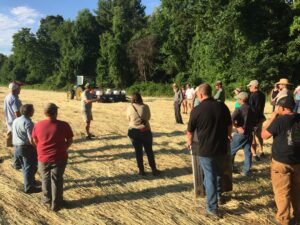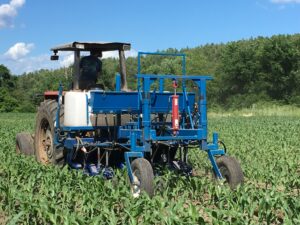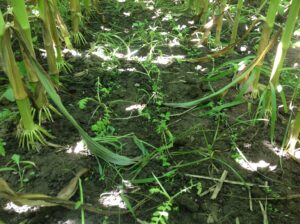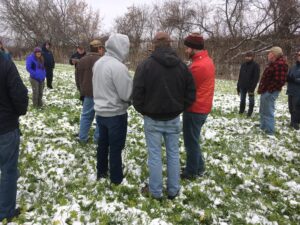2016 Annual Report for ONE16-284c
Increasing cover crop adoption through farmer peer-to-peer support
Summary
There has been a marked increase in the use of cover crops in recent years. Farmers with a wide variety of cropping systems, and at a range of scales, are increasingly using cover crops in ways that enable them to achieve soil conservation goals while maintaining or improving crop yields. According to the 2012 Census of Agriculture, 5025 acres were planted to cover crops; according to NH NRCS, farmers took advantage of aerial cover crop seeding programs to sow cover crops on some 3500 acres of cropland in 2015, more than triple the acreage of the previous year. However, this is still only a fraction of the more than 15,000 acres devoted to the production of field crops and vegetables statewide. There are still many opportunities for farmers to make better use of cover crops to reduce soil erosion and conserve nutrients.
There can be significant hurdles to integrating cover crops into rotations. For example, some benefits of cover crops only become apparent after several seasons, when improved soil structure, reduced erosion, and conserved nutrients and organic matter results in better crop yields. Some producers perceive the cost of seed and labor for establishing cover crops to exceed the benefits, or that their use comes at the expense of crop yields. Even producers who are more motivated to experiment with and make greater use of cover crops face challenges. Farms select species from dozens of options and employ new or unfamiliar planting practices, and they may need equipment that isn’t easily available to them. Making the wrong choice with anything from selecting the wrong species to improperly terminating a stand may yield poor results and discourage further experimentation.
The overall goal for the New Hampshire Cover Crop Team’s activities is to encourage adoption through peer-to-peer interaction and support. We hope to continue the conversation that has begun about cover crops by highlighting examples where they have been used successfully. We will achieve this by providing opportunities for farmers to make direct observations in the field and to exchange dialogue with others who have found ways to make cover cropping work in this state.
Objectives/Performance Targets
We intend to recruit farms to partner with us for educational activities and on-farm demonstrations. While we are primarily looking to highlight farms that use innovative cover crop species or planting practices, we also want to include a variety of production systems, including both field crops and horticultural crops; both conventional and organic management systems.
Proposed project activities include the following:
- We propose organizing two statewide Cover Crop Forums, in fall of 2016 and 2017. These events will be day-long, indoor programs where participants will have the opportunity to learn from their peers.
- Between fall 2016 and fall 2018, we will hold eight smaller scale field meetings in various locations around the state. These sessions will be held at the cooperating farms listed above and will highlight specific practices and techniques pertaining to the use of cover crops.
- On three sites where field meetings will be held in 2017 we will establish small field-scale (1-2 acre) plots with side-by-side comparisons to highlight issues of concern to farmers in the state and to demonstrate practices already known to be successful but that have not yet been widely adopted.
- We will produce a total of six short (approximately 5-10 minutes long) videos that cover the same innovative planting and management practices highlighted at the field meetings.
Accomplishments/Milestones
June 2016
- Identify farms for participation in forums, field days, and video series
- Select date and location for 2016 forum
The team has identified seven farms to host field days, forums, and/or videos, and is working to identify 2-3 additional farms.
September 2016
- Hold two field meetings: cover crops and no-till in vegetables, interseeded cover crops in field corn
We held a meeting in June at Adrien Lavoie’s farm in Hollis focusing on his use of cover crops and no-till in vegetable production.There were 40 people attending, including eight people from NRCS and Extension.
 Twilight meeting at Lavoie Farm, June 2016
Twilight meeting at Lavoie Farm, June 2016
In November, we held a field meeting at Bohanan Farm, a dairy operation in Contoocook, to see results of plot demonstrating the use of a Penn State interseeder on field corn and to learn about the other ways the farm has been using cover crops. There were 26 participants, including six from NRCS and Conservation Districts. Participants saw the challenges involved with mid-season establishment of cover crops, and learned about methods for establishing them post-harvest
 Interseeding field corn at Bohanan Farm, June 2016
Interseeding field corn at Bohanan Farm, June 2016  Interseeded field corn at Bohanan Farm, August 2016
Interseeded field corn at Bohanan Farm, August 2016
November 2016
- Hold 1st Cover Crop Forum
We held a cover crop tour of three dairy operations in Orford and N. Haverhill NH and Fairlee, VT that have experimented with cover crops, including use of a Penn State interseeder, living mulches, and a trial at the Grafton County Farm comparing mid-season and post-harvest establishment and different cover crop mixes. The event was a collaboration between members of the team with the Grafton County Conservation District, UVM Extension, and NH-NRCS. There were 34 participants, including 5 from NRCS
 Cover crop tour, November 2016
Cover crop tour, November 2016
March-November 2017
Gather footage detailing establishment and use of cover crops for video series
May- November 2017
- Hold three field meetings: cover crops and no-till in field corn production, cover cropping in organic vegetable systems, innovative methods of establishment
June 2017
- Select date and location for 2nd Cover Crop Forum
- Establish demo plots
November 2017
- Hold 2nd Cover Crop Forum
December 2017-February 2018
- Edit raw footage to produce video series
March 2018
- Post video series on UNH Extension YouTube channel, link to Extension, NRCS websites and social media
Collaborators:
Field Specialist, Food & Agriculture
UNH Cooperative Extension
PO Box 1480
Conway, nh 03818
Office Phone: 603-447-3834
Resource Conservationist
USDA-NRCS
The Concord Center
10 Ferry St, Suite 211
Concord, NH 03301
Office Phone: 603-223-6021
District Manager
Rockingham County Conservation District
110 North Rd
Brentwood, NH 03833
Office Phone: 603-679-2790